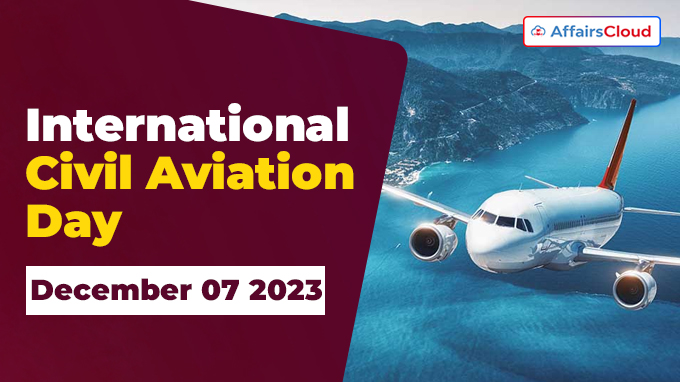 The United Nations (UN) International Civil Aviation Day is annually observed across the globe on 7 December to create awareness about the importance of international civil aviation and its role in the social and economic development of a country.
The United Nations (UN) International Civil Aviation Day is annually observed across the globe on 7 December to create awareness about the importance of international civil aviation and its role in the social and economic development of a country.
- The day also highlights the role of the International Civil Aviation Organisation (ICAO), a UN agency, in helping countries to cooperate and realise a truly global rapid transit network at the service of all mankind.
The 2023 theme of International Civil Aviation Day is “Advancing Innovation for Global Aviation Development”.
Note:
- Every 5 years, coinciding with ICAO anniversaries, the ICAO Council establishes a special anniversary theme for International Civil Aviation Day. Council representatives select a theme for the full 4-year intervening period between the anniversary years.
- The Council has decided the theme of International Civil Aviation Day from 2020 to 2023 will be: “Advancing Innovation for Global Aviation Development”.
Background:
i.International Civil Aviation Day was established in 1994 as part of ICAO’s 50th anniversary activities.
ii.In 1996, under an ICAO initiative and with the assistance of the Canadian Government, the United Nations General Assembly (UNGA) adopted the resolution A/RES/51/33 and proclaimed the 7 December of every year as International Civil Aviation Day in the UN system.
History of ICAO:
i.At the invitation of the United States of America (USA), delegates from 54 nations convened in Chicago (USA) in 1944.
ii.At this event, the participants concluded and signed the Convention on International Civil Aviation, also known as the ‘Chicago Convention.’
iii.It defines the international agreement that permitts the global civil aviation system to develop peacefully and in a manner that benefits all peoples and nations of the world.
New ICAO Framework:
i.During the 3rd ICAO Conference on Aviation and Alternative Fuels (CAAF/3) held in Dubai, United Arab Emirates (UAE) from 20 to 24 November 2023, the international aviation sector made significant steps towards ‘decarbonization’.
ii.ICAO and Member States adopted a new Global Framework for Sustainable Aviation Fuels (SAF), Lower Carbon Aviation Fuels (LCAF), and other Aviation Cleaner Energies.
- The framework aims for a collective 5% reduction in carbon dioxide (CO2) emissions in international aviation by 2030.
iii.ICAO’s Framework will support the clean energy transition of the aviation sector, aligning to achieve the current goal of Net-Zero carbon emissions by 2050 as adopted by the ICAO Assembly in 2022.
About International Civil Aviation Organization (ICAO):
ICAO is funded and directed by 193 national governments (Member states) to support their diplomacy and cooperation in air transport as signatory states to the Chicago Convention (1944).
Secretary General– Juan Carlos Salazar (Colombia)
Headquarters– Montreal, Canada




